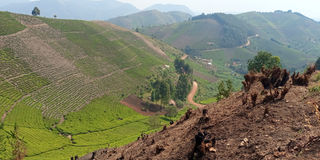Climate change hits tea farms in Buhweju

A cross section of tea growing areas in Buhweju West County, Buhweju District. Environmental degradation has affected the production of the cash crop. PHOTO | ZADOCK AMANYISA
What you need to know:
- More than 4,952 farmers have gone into tea farming, planting up to 16,106 acres mainly in the 11 local governments of Rwengwe, Nsiika, Kashenyi-Kajaani, Rwengwe, Engaaju, Nyakishana, Burere, Nyakashaka, Kyahenda, Nyakaziba, and Rubengye.
Tea production in Buhweju District has dropped due to climate change, with an acre which used to produce between 550kgs and 600kgs every harvest, now reduced to between 250kgs and 280kgs, according to district officials.
Several farmers, who spoke to Monitor, said they have incurred huge losses.
Mr Nicholas Abenaitwe, a tea farmer in Kikamba, Buhweju West, said his green leaf production has reduced from 15,000 kilogrammes to 10,000 kilogrammes per month due to the changing weather patterns.
“Previously, I used to produce 15,000kgs per month, but now, I harvest 10,000 or less. I lose about 5,000kgs per month. This is a loss of about Shs2.2m,” he said.
Mr Abenaitwe attributed the loss to continued bush burning and cutting down of trees.
“Buhweju is a hilly district. Normally, during the dry season, bushes around hills are burnt and trees are cut down leaving land and soils bare. This means that what would have controlled soil erosion no longer serves the purpose,” he added.
Mr Abenaitwe called for sensitisation of locals to stop poor farming practices such as bush burning. He also urged the government to agro-forestry and other programmes to mitigate climate change.
Mr Ronald Rwankangi, a farmer and director at Igara Growers Tea Factory, said climate change effects have reduced tea production by 50 percent.
“Climate change is real and for us tea farmers, we are already feeling it. If seasons keep changing and the rainfall reduces, our productivity will reduce significantly,” he added.
Mr Rwankangi said they have launched a campaign to restore the environment.
“We at the factory and the district leadership are encouraging the protection of wetlands. We are also championing tree planting so that we can conserve the environment,” he said.
The Buhweju West County MP, Mr Ephraim Biraaro, appealed to the government to enforce the law and protect the environment.
“Buhweju is threatened by rampant landslides, unreliable rainfall patterns, prolonged droughts and low crop yields. As citizens, we need to immediately stop swamp reclamations and deforestation,’’ he said.
The Buhweju District production officer, Mr Ian Atamba, said the district is losing huge volumes of water to environmental degradation.
“The wetlands are losing capacity to hold and filter water. Remember, the water we are losing would be of great help in rainfall formation. The situation, if not put to check and mitigated, could see farmers resort to irrigation, which uses more water,” he said.
Tea growing
Buhweju District has prioritised tea production as the chief source of income for households and local revenue since its creation in 2010.
More than 4,952 farmers have gone into tea farming, planting up to 16,106 acres mainly in the 11 local governments of Rwengwe, Nsiika, Kashenyi-Kajaani, Rwengwe, Engaaju, Nyakishana, Burere, Nyakashaka, Kyahenda, Nyakaziba, and Rubengye.





